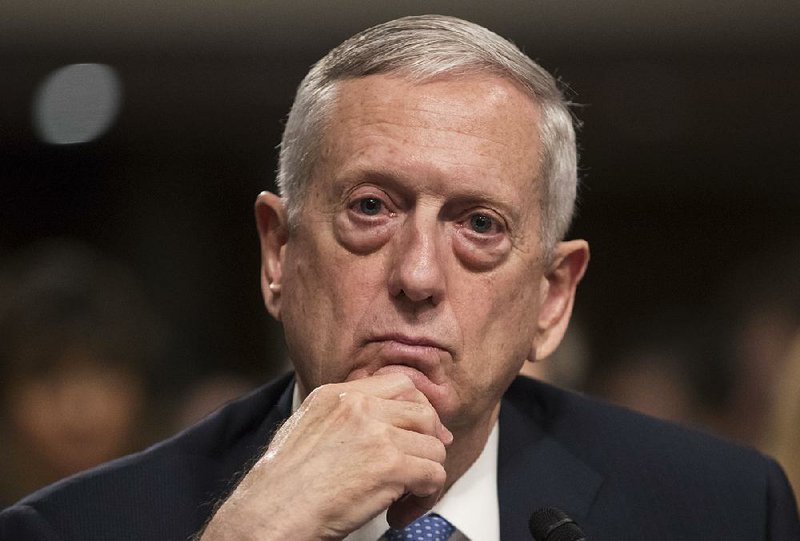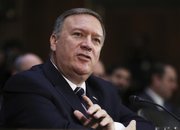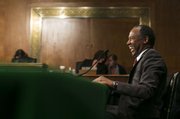WASHINGTON -- Retired Gen. James Mattis cruised Thursday toward approval to serve as Donald Trump's defense secretary, easily prevailing in a Senate vote that granted him an exemption that will allow him to run the Pentagon as a recently retired officer.
Senate confirmation hearings were held Thursday for Mattis as well as for Trump's picks for CIA director and housing secretary.
Mattis, at his hearing, declared Russia the nation's No. 1 security threat and accused Russian President Vladimir Putin of trying to "break" NATO.
The Senate voted 81-17 to override a prohibition on former U.S. service members who have been retired for less than seven years from holding the Defense Department's top job. Mattis retired in 2013.
The restriction is intended to preserve civilian control of the military. The House Armed Services Committee supported the waiver in a 34-28 vote. The full House is to take up the matter today.
Mattis, 66, spent four decades in uniform before retiring. He has a reputation as an effective combat leader and an astute strategist. Separate from Thursday's override legislation, the Senate will vote later on Mattis' nomination for the post.
The only previous exception to the seven-year rule was made for George Marshall in 1950, the year Mattis was born. Even some of Trump's strongest critics have supported the waiver for Mattis, arguing that Mattis' experience and temperament can serve as a steadying influence on a new president with no experience in national security.
It was unclear whether President Barack Obama would sign the legislation allowing Mattis to take up the post, or whether it would fall to Trump after his inauguration.
At an uncontentious confirmation hearing, Mattis sketched an international security scene dominated by dark images of an aggressive Russia, resurgent China and violent Mideast. He described Iran as a major destabilizing force, called North Korea a potential nuclear threat, and said the U.S. military needs to grow larger and readier for combat.
"We see each day a world awash in change," Mattis said. "Our country is still at war in Afghanistan and our troops are fighting against [Islamic State militants] and other terrorist groups in the Middle East and elsewhere. Russia is raising grave concerns on several fronts, and China is shredding trust along its periphery."
Mattis said the history of U.S.-Russian relations is not encouraging.
"I have very modest expectations for areas of cooperation with Mr. Putin," he said, delivering an assessment that's dissonant with that of Trump. Trump has repeatedly praised Putin, even as U.S. intelligence agencies have accused the Russian leader of orchestrating a campaign of interference in the 2016 U.S. election.
Mattis, a former NATO military leader, said of Putin, "He is trying to break the North Atlantic alliance."
Mattis said he has explained to Trump his views on Russia, which include a deep worry that Moscow is determined to use intimidation and nuclear threats to create a sphere of unstable states on its periphery.
Mattis, who has served in numerous senior military positions, including commander of U.S. Central Command in charge of all American forces in the Middle East, said he supports the Obama administration's moves to reassure European allies after Russia's annexation of Ukraine's Crimea region and military activity in eastern Ukraine.
While the U.S. should remain open to working with Russia, Mattis said, the prospects for cooperation are narrowing as areas of disagreement grow.
Mattis faced no hostile questions from Republicans or Democrats, receiving bipartisan praise for his reputation as a straight-talking, well-read man of integrity and intelligence.
RELATED ARTICLES
http://www.arkansas…">Trump, AT&T chief meet; merger disfavor said not to be topic http://www.arkansas…">2 from state praise Trump selections
[TRUMP: Timeline of president-elect’s career + list of appointments so far]
William Cohen, a defense secretary for Democratic President Bill Clinton, introduced Mattis as a "humble man with very little to be humble about."
"He's a man of thought as well as action," Cohen said.
Mattis repeatedly spoke up for traditional alliances, including those with NATO, South Korea and Japan, that Trump has questioned. The president-elect has expressed skepticism about U.S. security commitments unless those partners increase financial outlays for their own defense.
"We must also embrace our international alliances and security partnerships. History is clear: Nations with strong allies thrive and those without them wither," Mattis said.
He said Trump has shown himself to be open and inquisitive while discussing NATO with him. Asked how he, a retired four-star general, would negotiate his relationship with Trump's pick for national security adviser, retired three-star general Michael Flynn, Mattis said debate of policy issues "isn't always tidy" but he didn't expect any problems.
Asked about the possibility that Trump's Cabinet nominees may differ with Trump on Russia, incoming press secretary Sean Spicer said the president-elect was "not asking for clones" in selecting his senior advisers. Still, he said, "at the end of the day, each one of them is going to pursue a Trump agenda and a Trump vision."
CIA nominee hearing
In his confirmation hearing Thursday, Trump's choice to run the CIA -- U.S. Rep. Mike Pompeo, R-Kan. -- sided with intelligence officials who say Russia was behind the election cyberattacks, adopting a tough stand against that country. Ties between the former Cold War enemies have also been strained by Syria's civil war.
Pompeo said Thursday that he accepts the findings in an intelligence assessment that Russia interfered in the U.S. election with the goal of helping Trump win, even though the president-elect has been skeptical about some of the report's conclusions.
"Everything I've seen suggests to me that the report has an analytical product that is sound," Pompeo said. His comments struck a different tone from those of Trump, who called the focus on Russia and on the election a "political witch hunt" before he was even briefed on the findings.
Trump, for the first time Wednesday, acknowledged that Russia was behind the computer hacking that targeted Democrats during the 2016 campaign.
As head of the CIA, Pompeo would be responsible for sharing with Trump intelligence assessments that the president may find politically unappealing, including additional information on Russia's interference with the American democratic process. Pompeo promised senators on the intelligence committee that he would do so.
"My obligation as director of CIA is to tell every policymaker the facts as best the intelligence agency has developed them," Pompeo said. He is currently a member of the House intelligence committee.
This week Trump also said intelligence officials might be to blame for the leak of an addendum to the Russia assessment that was a summary of unverified claims that Russia had obtained compromising sexual and financial allegations about Trump.
On a separate matter, Pompeo said he would "absolutely not" comply with any orders from the president to again start using torture tactics to interrogate suspected terrorists.
During his confirmation hearing, Pompeo told senators that as CIA director, he would commit to disagree with Trump when necessary, and that Trump would expect him to do so.
Pompeo said "you have my commitment that every day, I will not only speak truth to power, but I will demand that the men and women ... who live their life doing that will be willing, able, and follow my instructions to do that each and every day."
HUD nominee hearing
Ben Carson, Trump's pick to head the Department of Housing and Urban Development, reflected on his years growing up Detroit's inner city, as he spoke Thursday during his confirmation hearing.
He is the nominee to head a sprawling agency that has 8,300 employees and a budget of about $48 billion.
Carson says he understands the needs of the country's most vulnerable people.
At his hearing before the Senate Banking, House and Urban Affairs Committee, the neurosurgeon talked about growing up in Detroit with his single mother who had a third-grade education and worked numerous jobs to keep a roof over their heads and food on the table.
"I have, actually, in my life understood what housing insecurity was," he told lawmakers.
Democrats in the GOP-run Senate questioned his experience. Carson said one of the things he's learned in private life as part of serving on various boards is how to find a good chief executive officer. He said a good CEO doesn't necessarily know everything about running a particular business, but he knows how to select people and use their talents.
Carson said HUD's rental assistance programs are "essential" to millions of Americans. The department, he said, has a lot of good programs, but "the progress perhaps has not been as great as one would like to see."
He displayed a softer approach toward the role of the federal government than he sometimes did on the presidential campaign trail. When reminded that he had called for across-the-board agency spending cuts of 10 percent during the campaign, Carson noted that he later modified that amount to 1 percent.
Carson talked about a more "holistic approach" to helping people and developing "the whole person." For example, he said, HUD could work with other agencies such as the Education and Labor departments on better access to a quality education and apprenticeship programs to train workers.
Several former HUD secretaries, Democrats and Republicans, wrote the committee in support of Carson. The letter was signed by Henry Cisneros, secretary under Clinton, and Mel Martinez, Alphonso Jackson and Steven Preston, who worked for President George W. Bush.
Carson, the only black major-party candidate in the 2016 presidential race, grew up poor. He attended Yale University and the University of Michigan Medical School, and was the first black person named as head of pediatric neurosurgery at Johns Hopkins Children's Center in Baltimore.
Before Thursday's hearing, Carson had said little publicly about federal housing matters. In a 2015 opinion piece, he criticized an Obama administration fair housing rule as government overreach. At his hearing Thursday, he told lawmakers that he would work with local HUD officials to "make sure that fairness is carried out."
Information for this article was contributed by Robert Burns, Eileen Sullivan, Deb Riechmann, Jennifer C. Kerr and Kevin Freking of The Associated Press; and by Missy Ryan, Dan Lamothe, Karoun Demirjian and Joby Warrick of The Washington Post.
A Section on 01/13/2017



